The Best Planner Apps for Android
Let me guess. Managing your daily to-do list is a constant challenge, and you feel it’s time to look for the best daily planner apps for Android to plan your day, organize your life at work, and save time.
Perfect, you have landed on the right page.
Let’s make one thing clear: It’s not only you. More of us need a day planner to keep up with our to-dos for the day or week. And there is nothing wrong with that.
Fortunately, there are excellent digital planner apps that work as personal assistants, helping us handle daily tasks efficiently in both our personal lives and at work.
Explore the best Android planner apps listed below to plan your day, schedule tasks, set deadlines, create reminders, and much, much more.
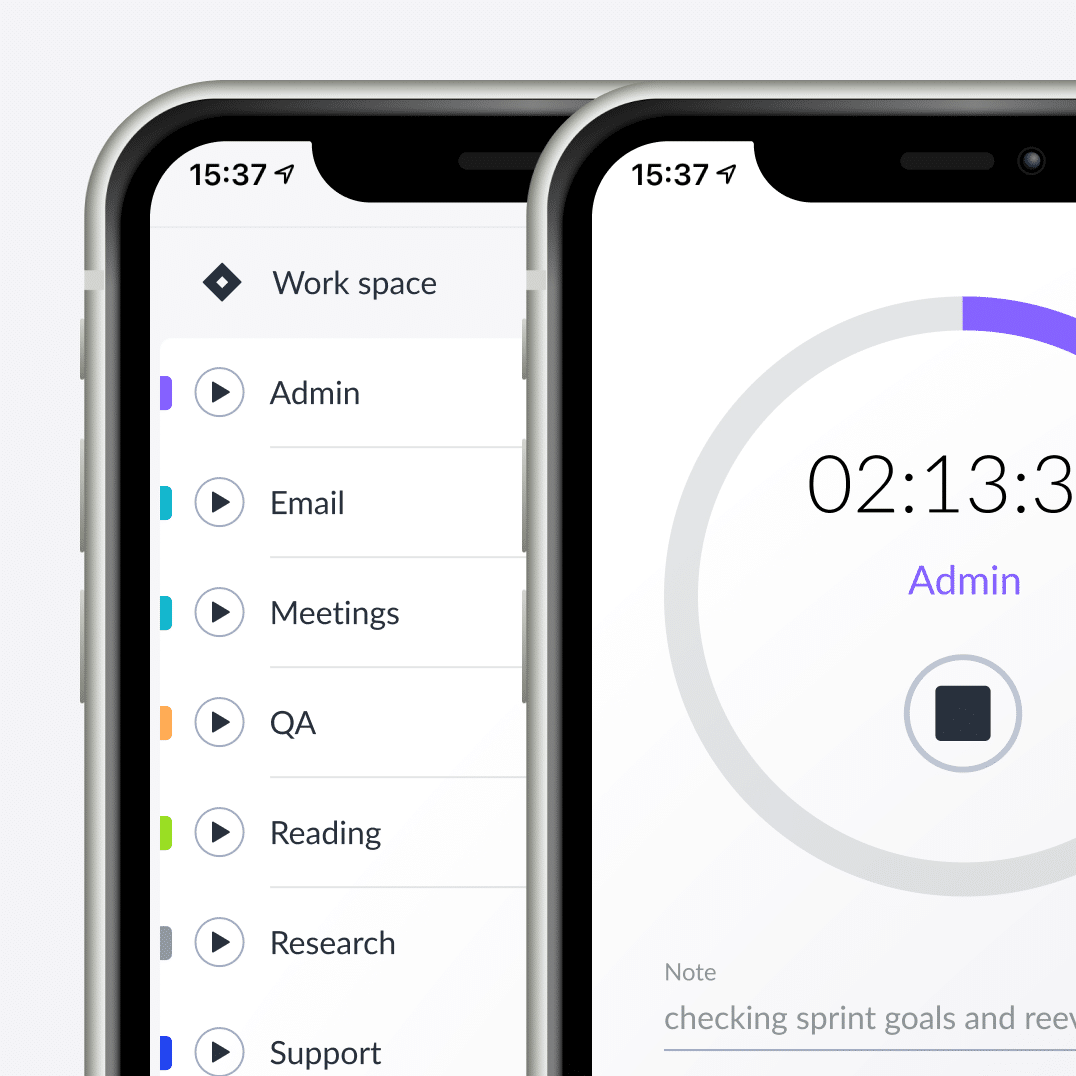
Track time on Android, web, and desktop. It’s simple, smart, and secure.
Comparison table of Android planners tools
| Android Planner App | Key Features | Platform | Collaboration | Offline Access | Price (Starting) |
|---|---|---|---|---|---|
| Google Calendar | Seamless integration with Android Multiple views Real-time syncing Collaboration Time zone support. | Android Web iOS | Yes | Yes | Free |
| Todoist | User-friendly interface Task prioritization Natural language input Collaboration Notification system | Android Web iOS | Yes | Yes | Free Pro: $4/month |
| Evernote | Versatile note-taking Rich media integration Hierarchical organization Collaboration Task management | Android Web iOS | Yes | Yes, with limitations | Free Premium: $8/month |
| Trello | Visual organization with boards and cards Checklists Labels Collaboration Task due dates | Android Web iOS | Yes | Yes | Free Standard: $5/user/month |
| Remember The Milk | Simplified to-do lists Location-based reminders Smart lists Collaboration | Android Web iOS | Yes | Yes | Free Pro: $50/year |
| Notion | Unified workspace Versatile app Note-taking To-do lists Databases Kanban boards Calendar views | Android Web iOS | Yes | Yes | Free Personal: $8/month |
| nTask | Comprehensive task and project management Gantt charts Risk management | Android Web iOS | Yes | Yes | Free Premium: $3/month |
| Any.do | User-friendly interface Smart planning assistant Time-based reminders Subtasks | Android Web iOS | Yes | Yes | Free Premium: $5/month |
| ZenDay | Time-fluid visualization 3D timeline Gesture-based interface Smart scheduling | Android | No (Individual-focused) | Yes | Free |
| TickTick | Simple interface Smart task creation Kanban board view Collaborative task sharing | Android Web iOS | Yes | Yes | Free Premium: $28/year |
What are the best daily planner apps for Android?
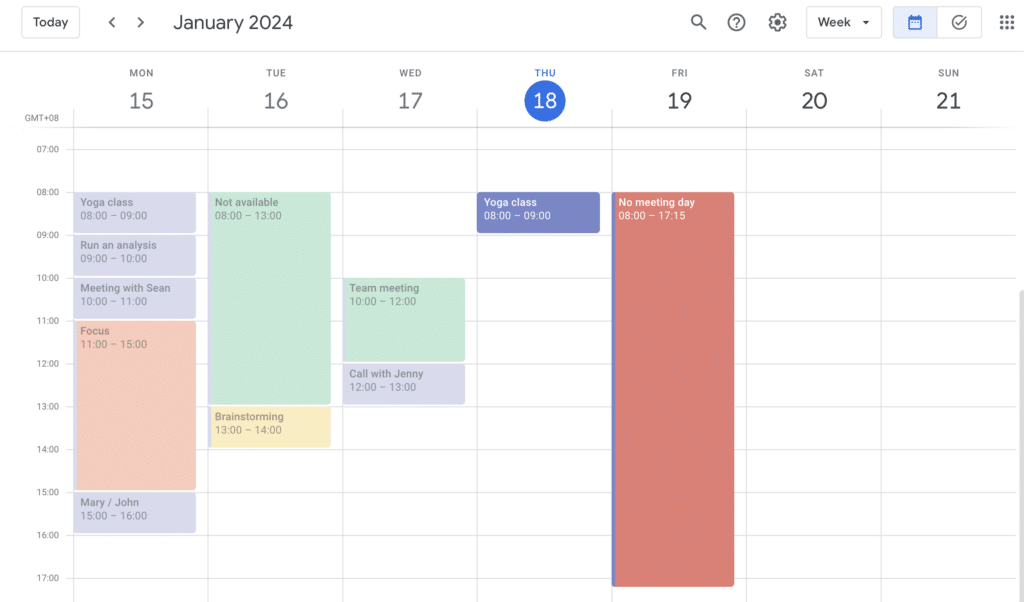
1. Google Calendar
Google Calendar is the top daily planner app for Android users. It easily works with Android devices, syncs across platforms, and seamlessly integrates with other Google services. This creates a unified system for scheduling and organizing daily tasks and appointments.
It offers a very intuitive and clean interface and is super simple to use when creating and editing calendar events and tasks.
It syncs in real-time across multiple devices and allows for sharing events or full calendars with others.
Best functionalities
The multiple views are one of the best functionalities of Google Calendar, offering the possibility of viewing days, weeks, and months, allowing users to choose the format that best suits their preferences and planning needs.
You can customize the type of event or task, synch with other calendars, and customize reminders and notifications. Google Calendar’s robust time zone support ensures accurate scheduling and eliminates confusion for those frequently on the move or working with teams across different time zones.

“The data acts as a review of how productive the day has been, and helps validate why I’m feeling tired when I look back and see the amount of hours clocked that week. Then I know it’s time to book a trip!” – Kaitlin Snow Seamons
It is one of the greatest Android daily planner apps if you’re looking for a reliable service where collaboration is a priority. Also, if you heavily use Gmail, Google Drive, and other apps, the seamless integration of the Calendar may be a decisive factor.
Pricing:
- Google Calendar is completely free to use, for businesses and individuals.
Use case
- Scenario: Sarah is a marketing manager working with a global team. She needs a week planner that seamlessly integrates with her Android device, allows collaboration, and handles different time zones. Google Calendar’s real-time syncing, multiple views, and integration with other Google tools make it an ideal choice for her busy schedule.
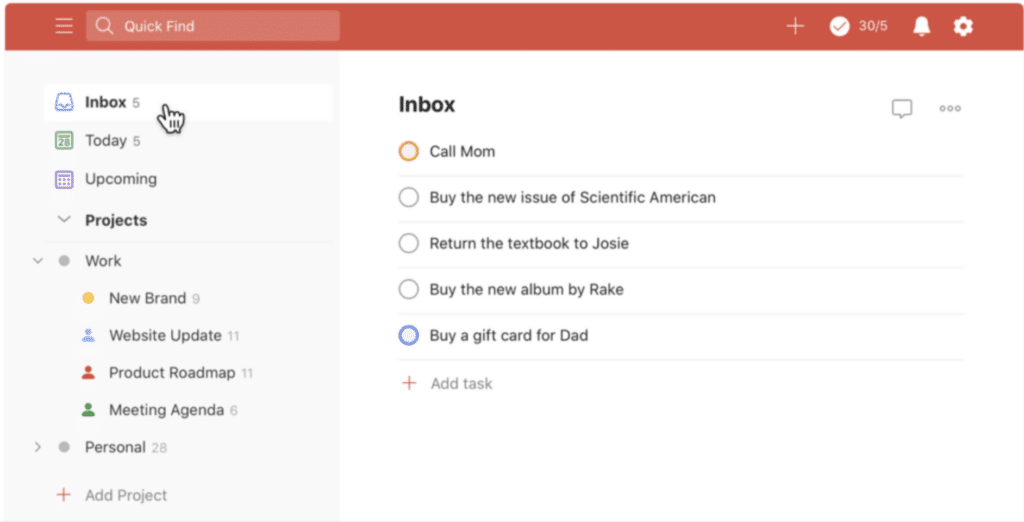
2. Todoist
Todoist is one of the most used Android apps for task management, offering a user-friendly interface that makes creating, organizing, and prioritizing a seamless process.
It’s easy to use and allows for a consistent experience across various platforms, allowing users to access their tasks and projects seamlessly from Android devices and web browsers. It also integrates with other applications and add-ons.
With Todoist, you can organize tasks into projects, breaking down larger goals into manageable components. It is a good prioritization tool that helps prioritize tasks based on urgency and set due dates to stay productive and on top of deadlines.
Best functionalities
One of Todoist’s most interesting features is its natural language input feature. It allows users to add tasks using plain language. For example, typing “Meeting at 3 pm next Friday” will automatically schedule a recurring task for the specified day and time.
Todoist also facilitates collaboration by allowing users to share tasks and projects and it offers a complete notification system that sends timely alerts for upcoming tasks and deadlines.
Pricing:
- The app is free for download on the Play Store and by default, the free Beginner plan is set. The Pro and Business plans start at 4€ per month when billed annually.
Use case
- Scenario: James is a freelance graphic designer juggling multiple projects. He needs a planner that is easy to use, allows task prioritization, and offers a consistent experience across devices. Todoist’s user-friendly interface, natural language input, and project organization features help James manage his tasks efficiently.
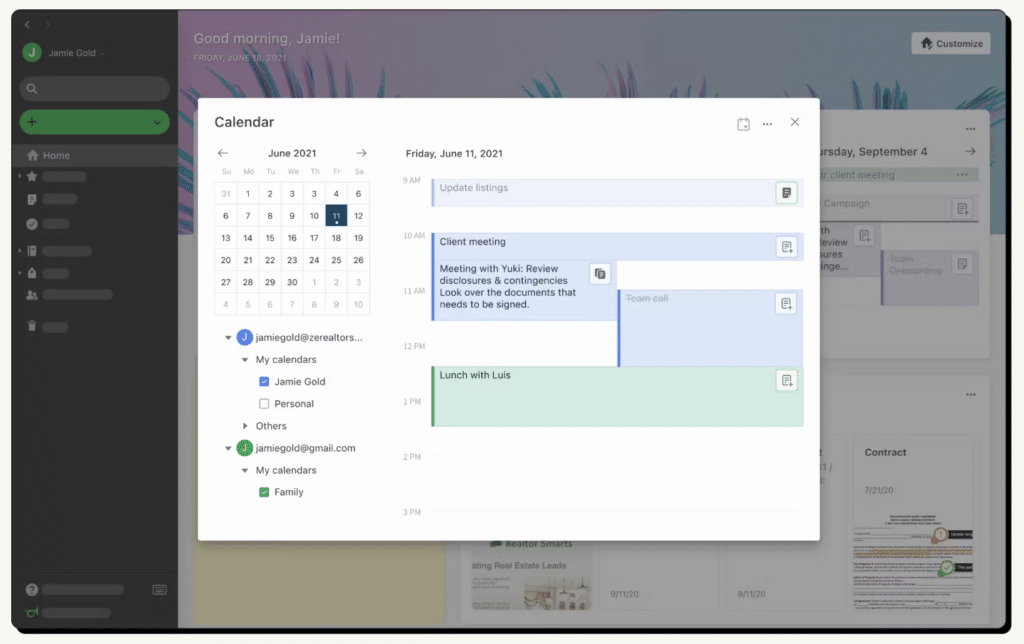
3. Evernote
Evernote is known for its versatile note-taking capabilities, allowing users to capture ideas, create to-do lists, and organize information efficiently.
It supports synchronization across various platforms, providing a consistent experience for users on Android devices. Beyond simple text, Evernote supports rich media integration, allowing users to attach images, audio recordings, and documents to their notes.
Best functionalities
In terms of functionalities, Evernote offers a hierarchical organizational structure, enabling users to create notebooks and digitally stack them organizing them by categories.
It provides a web clipping feature, allowing users to save images, articles, and web pages and attach them to meeting notes or brainstorming notes, for example. It also supports task management with checkboxes, making it a versatile tool for creating to-do lists.
Pricing
Evernote offers a free Basic subscription with essential features with downloading the application onto your Android device. The paid plans, Premium and Business start at around 8€ a month.
Evernote has some storage limitations, so if storage is a problem, going for a paid plan might be best.
Use case
- Scenario: Emily is a college student who wants a versatile digital planner for organizing class notes, to-do lists, and project details. Evernote’s rich media integration, hierarchical organization, and collaboration features make it perfect for Emily’s academic needs.
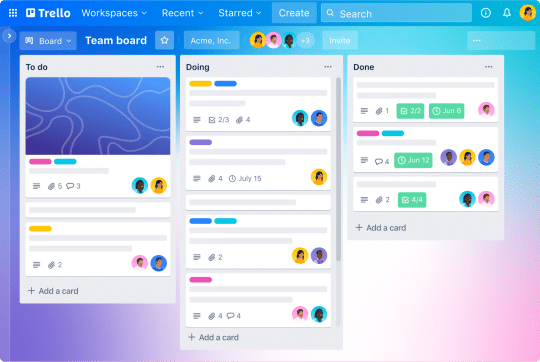
4. Trello
Trello is a popular project management tool that stands out for its visually intuitive and 100% customizable organization. It will help you plan your day, manage todos, and stay productive without sticky notes around the house.
As one of the best productivity apps for Android, Trello is built with boards, lists, and cards, allowing users to create a visual representation of their projects and plans easily.
Best functionalities
For planning and organization, Trello allows users to create checklists within cards and set due dates for tasks. This helps users break down larger tasks into manageable steps.
One of its most highlighted features is the labeling option. Trello provides labels that users can apply to cards for categorization. Filtering by labels makes things easier to find and manage.
Consider whether your planning process involves team members and how seamlessly Trello can integrate into your collaborative workflow. Trello has a very visual approach, so consider if that works for you and suits your needs.

“If you’re not tracking then you could be giving your time away for free. Using Timeular allows us to be intentional about how we plan and spend our time.” – Richard Wingfield, Head Geek at Envision Design
Pricing
The standard plan at Trello starts at 5$ per user per month, the app download is free and comes with the basic services.
Use case
- Scenario: Alex is a project manager overseeing a team of developers. He needs a visual planner that facilitates collaboration and task organization. Trello’s boards, lists, and cards, along with labels and due dates, help Alex create a dynamic visual representation of his projects for efficient team management.
Read also: Time tracking in Trello
5. Remember The Milk
Remember the Milk is an app designed to simplify planning, ensuring users can manage their to-do lists efficiently. Its name reflects what the app’s creators were aiming for, helping the user remember things.
Remember The Milk seamlessly syncs across multiple platforms, offering users consistent access to their tasks and plans on Android devices. The app provides smart lists and filters that allow users to organize recurring tasks based on criteria such as due dates, priority levels, and tags.
Best functionalities
The app offers location-based reminders, allowing users to receive alerts when they are in a specific geographic area.
Remember The Milk is also suitable for collaborative planning as users can share and delegate tasks with ease.
If you appreciate a straightforward and intuitive approach to organizing tasks, Remember The Milk is the way to go.
Pricing
Remember, The Milk is for free, with some more advanced features being available in the Pro version, and costs around 50$ per year.
Use case
- Scenario: Mark is a frequent traveler who often forgets important tasks. He needs a simple and location-aware planner. Remember The Milk’s location-based reminders ensure Mark receives alerts for tasks when he’s in specific geographic areas, helping him stay organized on the go.
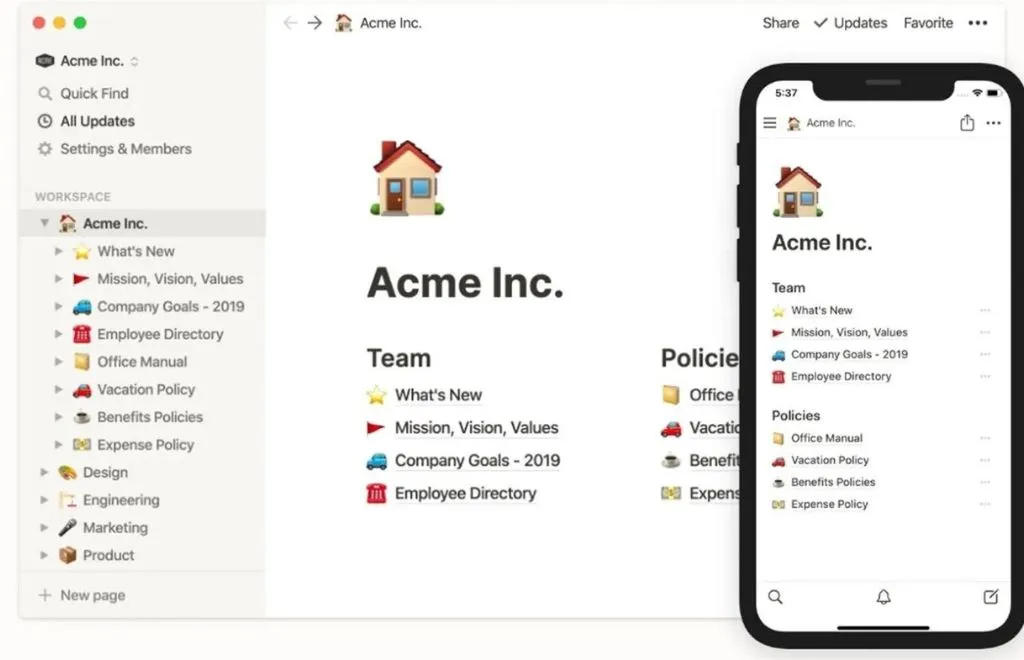
6. Notion
Notion provides a unified workspace where users can manage projects, create notes and track progress all within a single app. This versatility makes it a top-free digital planner and an excellent choice for users looking for an all-in-one planning and organization tool.
Notion’s flexible structure allows users to organize information using pages, databases, boards, and more. It demonstrates great adaptability to different planning styles.
Best functionalities
Notion combines note-taking with database and spreadsheet functionalities and supports Kanban-style boards and calendar views, providing users with visual representations of their tasks and plans.
A good approach for those who prefer a more visual way of planning. Notion allows users to access and edit their content even when offline.
Pricing
Notion offers a free subscription, with paid ones starting at 8$ per user per month, when paid annually.
Use case
- Scenario: Jessica is a content creator managing various projects, from blog posts to video production. She needs an all-in-one planner that supports note-taking, task management, and collaboration. Notion’s versatility with notes, databases, and boards allows Jessica to streamline her content creation workflow.
Read also: Notion time tracking integration
7. nTask
As a planner and a good project management tool, nTask offers a comprehensive task management system, allowing users to create, organize, and prioritize tasks.
It goes beyond individual task management by providing robust project management features, so that users can create projects, assign tasks, set milestones, and collaborate with team members, making it suitable for personal, team member, and professional planning.
Best functionalities
nTask includes Gantt charts, giving the users a visual representation of project timelines and task dependencies. Its most unique and standout feature, is the risk and issue management feature it has, which helps users identify potential risks, track issues, and implement strategies to mitigate them.
Pricing
nTask offers both free and paid versions. The free plan includes essential features, with the premium plans offering more advanced features, starting at 3$ per month.
Use case
- Scenario: David is a project manager handling complex tasks with multiple dependencies. He needs a planner that offers project management features like Gantt charts and risk management. nTask’s comprehensive task and project management capabilities help David efficiently plan, track, and mitigate risks in his projects.
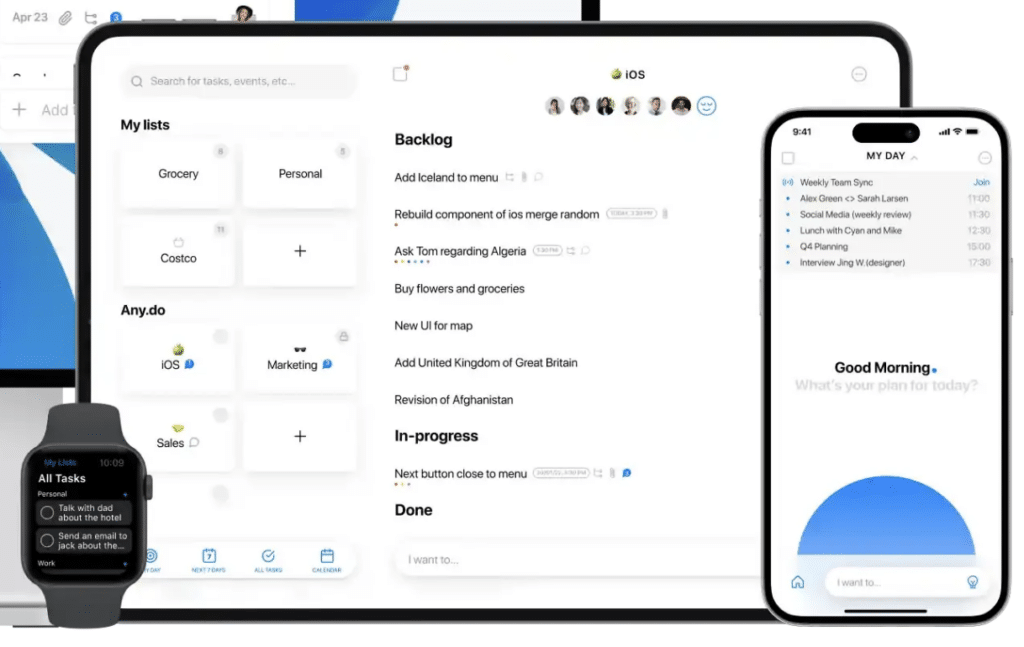
8. Any.Do
Any.do provides a user-friendly interface, making it easy for users to manage tasks and plans seamlessly. It syncs across various platforms, guaranteeing accessibility for users on the go.
Any.do include a smart planning assistant that suggests tasks and helps users plan their day, while also supporting voice entry for adding tasks.
Best functionalities
The best functionalities provided by Any.do involve time-based reminders for tasks, providing timely notifications for upcoming activities.
Any.do offers a daily planner view, providing users with a complete overview of their day’s tasks and events. This visual representation helps users prioritize and organize their activities for improved productivity.
It’s also possible to add subtasks and checklists, a level of granularity that isn’t offered by a lot of planning apps.
Pricing
Any.do offers both a free version and premium version. The premium plan, of the same name, starts at 5 dollars monthly, billed annually. Family and Team plans go for 8$ monthly.
Use case
- Scenario: Lisa is a busy professional who values simplicity in her daily planning. She needs a straightforward app with smart planning assistance. Any.do’s user-friendly interface, time-based reminders, and daily planner view provide Lisa with a clear overview of her tasks, enhancing her daily productivity.
9. ZenDay
ZenDay offers a unique time-fluid visualization of tasks and events. Rather than using the traditional list or calendar view, ZenDay uses a 3D timeline that dynamically adjusts based on your priorities and deadlines. It integrates easily with external calendars, providing a consolidated view of tasks and events, prepared to be used in one or more Android devices.
Best functionalities
The app features a gesture-based interface that allows users to drag and drop tasks onto the timeline. This interactive design feature makes it easy to modify and organize schedules with a simple swipe or tap.
ZenDay also incorporates smart scheduling algorithms that adapt to the user’s planning habits. By learning from your habits and patterns, it suggests optimal times for task completion, helping you allocate time efficiently and optimize your productivity.
Pricing
Free
User case
- Scenario: Michael is a visual thinker who prefers a unique approach to planning. He needs a planner with a visual timeline and smart scheduling. ZenDay’s 3D timeline and gesture-based interface allow Michael to dynamically adjust his schedule, making it easy for him to visualize and manage his tasks.
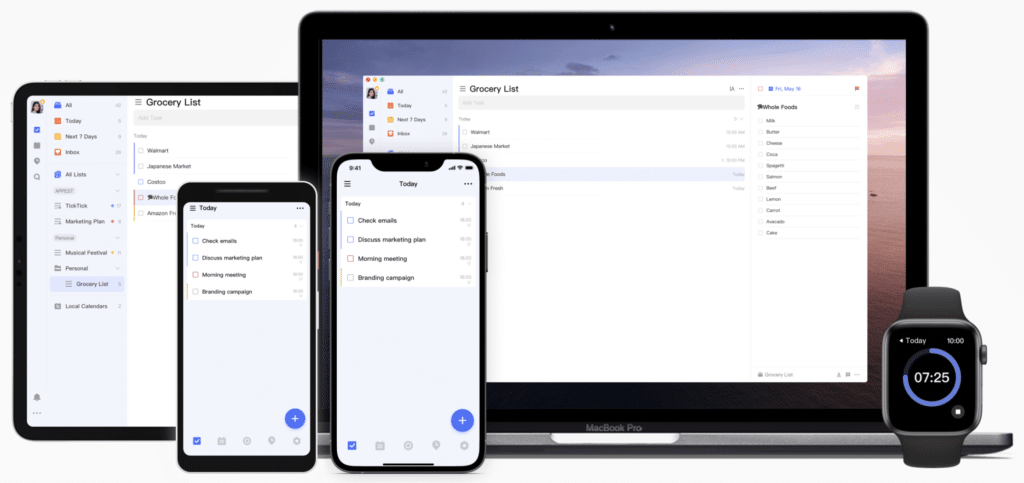
10. TickTick
TickTick is a good choice when selecting a planning app for Android for its simplicity. Like many others, it seamlessly syncs across various platforms, ensuring that your tasks and plans are always accessible.
TickTick helps with smart task creation, allowing users to input tasks using natural language. This means you can quickly add tasks with details like due dates, reminders, and priorities without having to navigate through complex menus.
Best functionalities
TickTick uses a Kanban board view, providing users with a visual representation of their studies in different stages and supporting collaborative task sharing, allowing users to share tasks and lists with others. It integrates with several calendars, allowing for a unified view of their tasks and events.
This app is a good choice for those who value a straightforward interface. TickTick is a great app known for its collaborative features, including task sharing.
Pricing
TickTick offers a free plan, with the paid option costing around 28$ per year.
Use case
- Scenario: Laura is a team leader coordinating tasks among her team members. She needs a planner that supports collaborative task sharing. TickTick’s Kanban board view and collaborative features allow Laura to efficiently share tasks and manage workflows with her team.
Features to look for when choosing a good planner app for Android
- Intuitive interface: A user-friendly interface is crucial for a planner app. Make sure to look for an app that is easy to navigate and allows you to quickly add and edit your plans.
- Notification system: Customizable reminders, recurring alarms, and push notifications are features that contribute to effective time management.
- Offline mode: Choose an app that offers offline access to your schedule. This feature allows you to view and edit tasks and plans even when you don’t have an internet connection.
- Calendar integration: An integration with your calendar is a must-have. A good daily planner app should sync with your Android calendar, providing a wide view of all your events, appointments, and tasks in one place.
- Security and privacy: Your Android planner app should prioritize the security of your data. Look for apps that offer secure login options, data encryption, and privacy settings to protect your personal and professional information.
- Integration with other apps: Make sure your planner app integrates with other tools and services you use, like email, cloud storage, maps, and others. This streamlines your workflow and helps enhance overall productivity.
Read also: How to prioritize tasks
Conclusion
The right planner app for Android can be a game-changer if you want to stay organized, and manage your calendar events and a never-ending to-do list.
When choosing the best daily planner app, consider your specific requirements and your daily needs. Whether it’s an intuitive interface, notifications on the go, simpler visuals, robust collaboration features, or seamless integration with other tools, the perfect planner app awaits you.